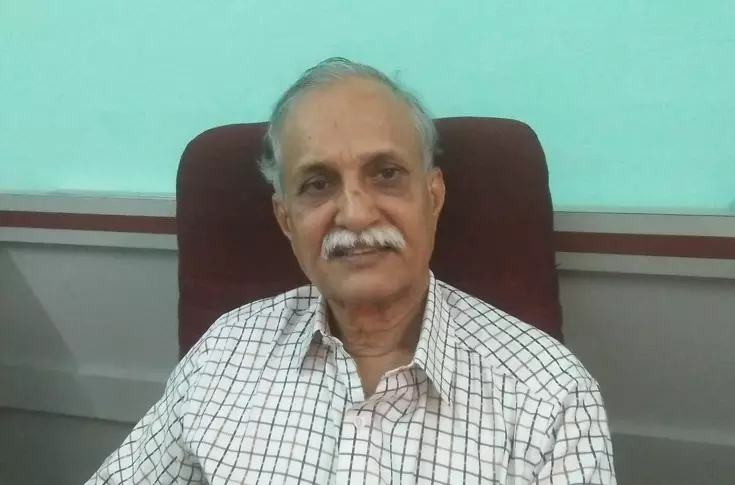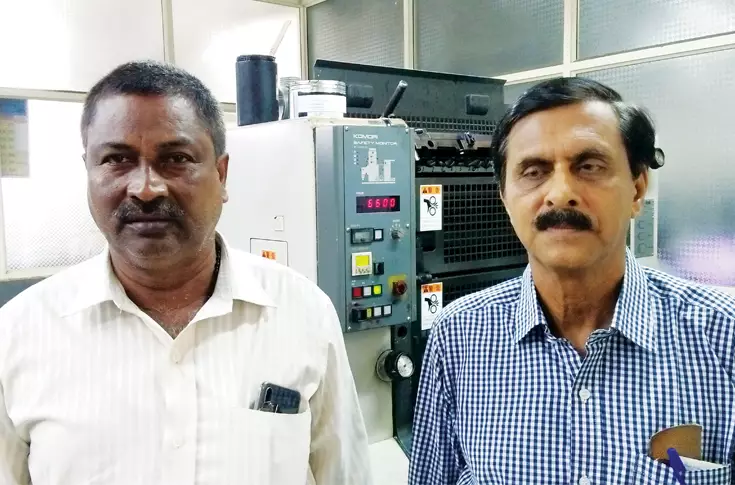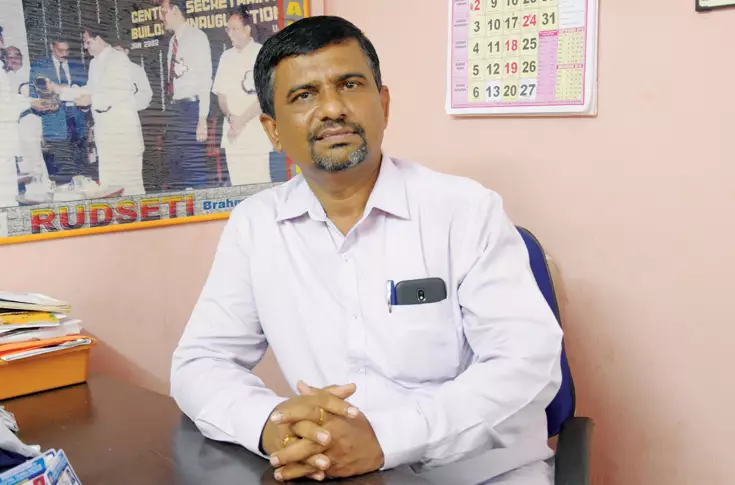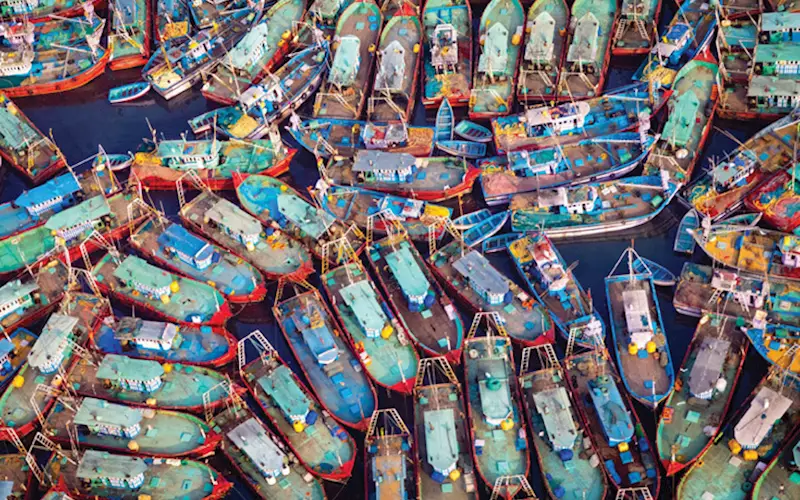How printing thrived in the Land of Udupi
The students of Department of Media Technology, Manipal Institute of Technology in Manipal spent one full day at a printing press and interacted with owners. A report from the pristine coastal town of Karnataka
03 Apr 2019 | By PrintWeek India
M Ramesh Kini, Dashrath Plastics

How did you get into print?
Our journey in print began in 1972 with a letterpress – two treadlew and one cylinder printing machine. In fact, in the early days Syndicate Bank was our only customer before we switched to packaging. From brown paper bags to plastic bag printing (1978) and finally producing the bags (1985); our journey has seen many demands.
Can you tell us more about your growth story?
In terms of printing presses, our foray into flexo press was as early as 1985 with rubber plates which were replaced by polymer plates in 1992 for better image quality. Slowly we introduced screen in the flexo plates. In 1996, we introduced a six-colour press. Later we added a ten- colour press in 2001 for better colour options including printing high-quality halftone prints. This is why we are market leaders in this area.
What is your take on the plastic ban implemented by the state governments?
When compared to paper and cloth bags I believe plastic has several advantages, and this includes the fact that it has much superior re-usability over its counterparts. Also, if properly disposed of it is recyclable too. Only certain grades of plastics create a problem. 50 microns is more advantageous than other grades; it can be used multiple times.
One thing that is harming the industry in your town?
Honestly, as pioneers in flexographic printing, we face very little challenges in the market. Of course, creating awareness in the initial stages was a big task. We are six brothers who have taken upon ourselves to master any new technology and then train our employees thereby countering problems of employee attrition.
Tell us about your customers?
We cater to the local customers as well as customers from districts in Karnataka – Davangere, Shimoga, Karwar, Mysore, and Coorg to name a few.
One job which you wish you had printed?
We were very keen on landing the Tata Salt pouch job but then the Tata factory is in Tuticorin. The distance was at a considerable and that affected our rates as compared to the printers nearby. It was a massive job of up to one-lakh pouches per day which would have required us to have a dedicated machine.
Have you had issues with any colour reproduction?
No, not really. We have sufficient knowledge in colour mixing which has helped us in the production.
One blunder on the shopfloor which you committed that taught you an important lesson?
There have been a few incidents to be honest. Due to carelessness in loading the anilox roller to the fifth and sixth station, damaging the plates. We have lost some money. It generally happens in the second shift. Also, rejection by QC due to smudges is a significant lapse.
Any printing company or exhibitions you look upto?
When we started our business there was no internet. The only way to get to know the information was exhibitions. Plast India which used to be held once in three years at Pragati Maidan, has been shifted to Ahmedabad. In my opinion, it is one of the excellent exhibitions. We never miss attending the show.
Every time we see a transition in technology, we have ensured that we have invested in it.
We have also visited several exhibitions in Germany, but I think there's not an exhibition which matches the calibre of PlastIndia.
Mohan Upadyaya, Print Park

(r) Mohan Upadyaya of PrintPArk
Haleema Shifana and Swapnaneel Chakraborty interviewed Mohan Upadyaya.
How did you get into print?
I started my career in a transport company where I noticed the amount of printed material required. That's when I realised the potential of print. This how Print Park started.
Tell us about some of the tough jobs you have executed?
While printing outsourced work is a major challenge. I personally think doing quality work for bigger firms is the real challenge for us which we have had to handle. We are the first in the town to own a four-colour press despite the volume of work is comparatively less.
What are the challenges you face in the industry?
For a company like our in a remote town, labour is the biggest challenge. Most qualified youngsters move to bigger cities where they are fine with working as salespersons in a shop.
The middlemen are a huge problem for us. Since they have no liabilities, they dramatically bring down pricing for an establishment like ours.
Any future plans for your company?
I was keen on starting cluster printing in Udupi. Unfortunately, it did not take off. So, we started this partnership firm with 21 partners and have been running it smoothly for six years. I think running a company with so many partners is tough. This is because each of them comes with their own thoughts and ideas. But it makes our venture unique.
Together, we are a strong team.
Do you have any dream job?
Honestly, we are more than happy to get more jobs to start with. Considering the investment we have made, we are competing with printers from Bengaluru and Mangalore. But we struggle most of the time because of our location.
Can you share the experience and challenges you faced during your tenure as the founder secretary of Udupi District Press Owners Association?
One important outcome during my tenure was to do with the introduction of DA to all workers by the Government of Karnataka. Though it was a good initiative, the government also wanted us to pay arrears dating back to several years which was not only cumbersome but near impossible. I took the initiative to form a union for press owners. This helped us win the battle. Later the government announced their decision to remove the order for DA arrears.
We also took the initiative to start a cooperative bank Udupi Mudrakala Sauhardha through which workers can get a loan with lower interest.
Mahesh Kumar, Vigneshwara Printers, Malpe

Anjali RB and Raksha APK interviewed Mahesh Kumar
How did you get into print?
From my school days, I had a burning desire to become an entrepreneur. I started my printing journey as early as my tenth standard when I joined a print firm as a worker. With a serious financial situation at home, I did not have a choice but continue in the job. I used to work 14 to 16 hours every day. I loved my job and that helped me reach this level.
What are your future plans?
I continuously invest in crucial aspects of my company and this ensures we stay ahead of our competition. I am a regular visitor to various exhibitions, seminars etc. Our next step is to buy a two-colour press.
Do you find any type of job particularly tough?
One of our key attributes is promptness in service and quality of delivery which has helped us retain customers who have worked with Vigneshwara since starting operations. Labour problem is the only issue which disturbs the smooth functioning of our press.
Do you have any dream regarding the press?
As a printer in the interiors of Karnataka, we are more than satisfied to cater to our existing customers. Like I said our quality of service has ensured we retain them.
How do you manage your customers?
Mostly I visit our customers, meet them often while my brother manages the production. My role is to meet customers, prepare and send quotations, tenders and e-tenders.
What is the USP of your press?
Service at any point of time is our specialty. I have several customers who give us a job in the evening and want delivery by early morning. The delay from my side will cause heavy loss but we have delivered almost every time.
Do you have any specific problems you face in the industry?
No. In terms of technology, we have a major change on cards. I take time to research whatever product we are buying and after careful thought we put in our money. We try to do a group purchase with our peers so that we get the best deals.
One blunder on the shop floor which taught you an important lesson?
Colour variation is a huge problem in offset printing. Date change is another big problem in invitation printing especially during the year change.
You are the secretary of Udupi District Press Owners Association, what are your goals for the association?
There are hundreds of small presses in Udupi district. I wish to help them by imparting knowledge on latest technologies. Most of them are unaware of changes happening because they never visit any exhibition or have such interactions. I also want to create an environment for them to group buy new machines and ensure they get the best deal.
Ashok Shetty, Ashok Printers

Kyntu Bhalang Longdhar and Shashank Bayari G interviewed Ashok Shetty
How did you get into print?
As a second-generation printer, I must say that printing is in my blood. This venture was started by my dad 20 years ago with a treadle press and one simple cutting machine. In the recent years, my brother and I transformed it into an offset printing company.
Do you have any dreams for printing?
Simply put, all I wish for is the industry to flourish and ensure we have regular jobs. Not only us but families of our employees and thousand others are dependent on this wonderful industry.
What are the challenges you face in running your company?
As you know Udupi is not an industrial town. The available jobs are less but we have almost 300 printers competing for these jobs. To top that, labour is a major cause of concern for us.
According to you, what is the importance of printing?
It is very important. A man’s day begins with print, I mean reading the newspaper and ends with reading a book before sleeping. It is like food; it's very essential.
Tell us about some of the most challenging jobs that you have executed?
I think magazine printing is the most challenging type of jobs. Not only is quality paramount but deadlines are tight and the jobs are given to us in the last minute.
What do you think makes your company stand out?
As a company policy, we provide certain services for free or at a low price. For example, we print wedding cards for free for people who cannot afford it. We also distribute notebooks to poor children. This is our own little way of helping society.
Any tricky jobs?
Any job with special colours like gold is tricky. Especially, temple invitations with a picture of the deity, or brochures for jewellery shops etc.
As Udupi District Printers Association president what is your responsibility?
To help our brother printers of Udupi in getting good print jobs and skilled labour. There is also a plan to create a training centre. We hope the government will help us by providing space, machine and stipend to the students.
What is your message for us students
For me, printing industry is the best. Whether rich or poor, every person needs printing. You have chosen the best course. You have access to updated technology like MTL.
My best wishes are with you.











 See All
See All